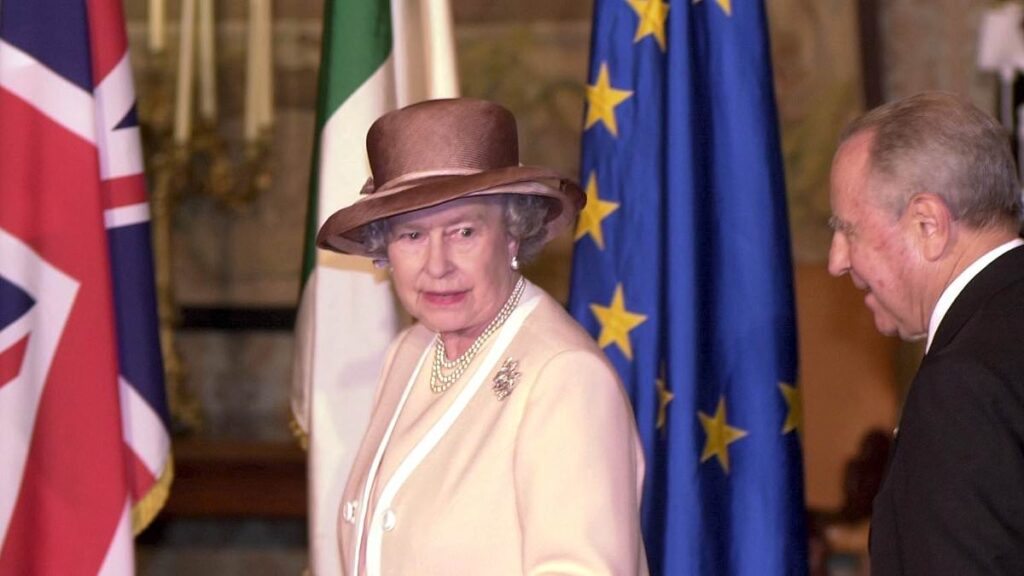
The late Queen Elizabeth II, renowned for her political neutrality, has been posthumously thrust into the Brexit debate, revealing a rare glimpse into her private views. According to a new book by Valentine Low, former Royal Correspondent of The Times, the Queen expressed reservations about the United Kingdom leaving the European Union, a stance that contradicts earlier public perceptions.
During the 2016 EU referendum, The Sun newspaper sensationally claimed that the Queen supported Brexit, citing alleged remarks made during a 2011 lunch at Windsor Castle. However, Low’s book, “Power And The Palace: The Inside Story Of The Monarchy And 10 Downing Street,” suggests otherwise. A senior minister reportedly recalled the Queen saying, “We shouldn’t leave the EU,” just months before the referendum, indicating her preference for stability over political upheaval.
The Queen’s Legacy of Neutrality
Throughout her reign, Queen Elizabeth II maintained a steadfast commitment to political impartiality, a cornerstone of constitutional monarchy. Her ability to remain above the fray of political debates was a defining characteristic of her leadership. Yet, the 2016 referendum posed a unique challenge, as the monarchy found itself inadvertently embroiled in one of the most contentious political issues of recent times.
The Sun’s headline, “The Queen Backs Brexit,” created a dilemma for Buckingham Palace. Denying the claim risked alienating pro-Leave supporters, while remaining silent left room for speculation. The Palace’s predicament highlighted the delicate balance the monarchy must maintain to preserve its apolitical stance.
Insights from Valentine Low’s Book
Valentine Low’s book sheds light on the Queen’s private views, suggesting her opposition to Brexit was not ideological but rather rooted in a desire for stability. A source close to the Queen reportedly stated, “It’s better to stick with the devil you know,” reflecting her cautious approach to change.
Low’s revelations align with sentiments expressed by those familiar with the Queen’s thinking. A former speechwriter for the Queen noted, “Her Majesty was not a supporter of Brexit,” emphasizing her concerns about potential instability and constitutional upheaval.
Historical Parallels and Monarchical Concerns
The House of Windsor’s apprehensions about national disorder are not unprecedented. Historical parallels can be drawn to the monarchy’s response to political turbulence in the past. In 1986, the Queen’s press secretary, Michael Shea, leaked to The Sunday Times that the Royal Family was dismayed by Prime Minister Margaret Thatcher’s policies, fearing they were socially divisive.
“There is no evidence to indicate that Shea leaked at Her Majesty’s behest, [but] I’m in no doubt that he was broadly reflecting the views of the Queen and other senior members of the Royal Family,” stated Andrew Neil, former Sunday Times editor.
This incident underscores the monarchy’s role as a unifying force and its sensitivity to policies perceived as socially disruptive. The Queen’s concerns about Brexit echo this historical unease, rooted in a fear of constitutional instability.
The Monarchy’s Role in Political Stability
The late Queen’s apprehensions about Brexit reflect broader monarchical concerns about maintaining national harmony. The monarchy’s primary function is to act as a stabilizing force, ensuring continuity and unity. Any perceived threat to this stability, whether from domestic policies or international relations, is met with caution.
The Queen’s fears of constitutional tumult are reminiscent of her grandfather, King George V, during the Russian Revolution of 1917. Despite personal ties to the deposed Tsar Nicholas II, George V withdrew an offer of asylum, fearing revolutionary sentiments might spread to Britain.
“He must beg you to represent to the Prime Minister that the residence in this country of the ex-Emperor and Empress would be strongly resented by the public and would undoubtedly compromise the position of the King and Queen,” wrote George V’s private secretary.
While the Brexit referendum did not pose a comparable threat, the Queen’s concerns about national stability were deeply ingrained and historically informed.
Implications and Future Considerations
The revelations about the Queen’s views on Brexit invite reflection on the monarchy’s role in contemporary politics. As Britain navigates its post-Brexit landscape, the monarchy’s influence as a symbol of continuity remains vital. The late Queen’s cautious approach serves as a reminder of the delicate balance between tradition and change.
Looking ahead, the monarchy’s ability to adapt to evolving political landscapes while maintaining its apolitical stance will be crucial. As the nation grapples with the consequences of Brexit, the Royal Family’s role in fostering unity and stability will continue to be of paramount importance.







